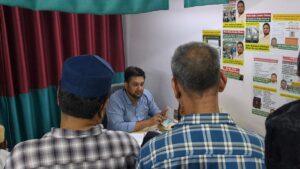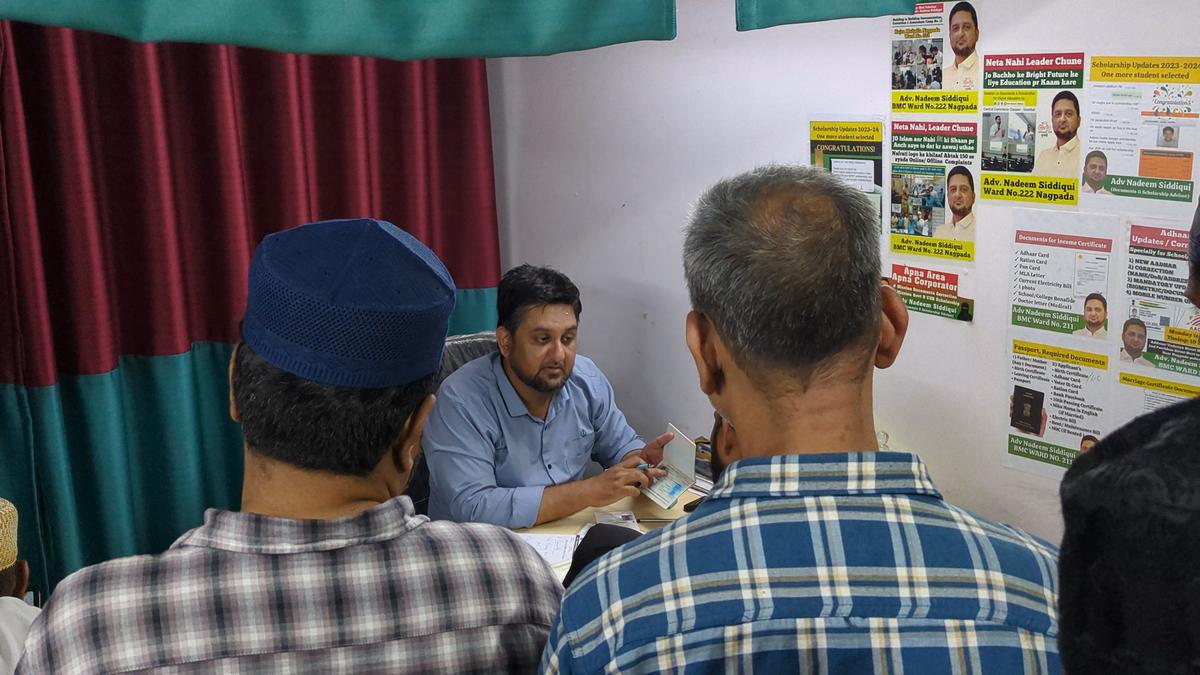After learning of the CAA regulations, Muslims in Mumbai are hurrying to organize their documentation
Response to CAA Regulations
“The fear, particularly among Muslims, of the implementation of CAA and NRC has somewhat increased”
April 11, 2024 09:32 am | Updated 09:32 am IST
GAUTAM NIRMAL DOSHI

Advocate Nadeem Siddiqui offering free consultation to people coming to him for help in his Nagpada office in Mumbai. | Photo Credit: Special Arrangement & The Hindu
The roads going to Nagpada intersection in Mumbai Central are crowded with activity around 10.15 p.m. on Ramadan. However, 43-year-old advocate Nadeem Siddiqui is back at work in his office after evening prayers and iftar, less than five minutes’ walk from the junction. He provides free legal assistance to people to make sure that their identity documents are accurate. He also provides assistance to those who want to apply for scholarships to pursue further education overseas.
The roads going to Nagpada intersection in Mumbai Central are crowded with activity around 10.15 p.m. on Ramadan. However, 43-year-old advocate Nadeem Siddiqui is back at work in his office after evening prayers and iftar, less than five minutes’ walk from the junction. He provides free legal assistance to people to make sure that their identity documents are accurate. He also provides assistance to those who want to apply for scholarships to pursue further education overseas.
There is a line outside his office, where there is seating for up to four people who can receive assistance at once. With the help of four volunteers, Mr. Siddiqui was accessible from 2:00 pm to 5:00 pm even throughout Ramadan.
The final draft of NRC excluded 19.06 lakh people of the 3.3 crore people who had applied for inclusion in Assam. While the exercise was done to document the legal citizens of India so that the illegal immigrants can be identified and deported, critics have held their opinion that the government could use the list to deprive some Muslims, who could be marked as doubtful citizens, since CAA paves the way for granting citizenship to undocumented non-Muslim migrants from Pakistan, Bangladesh and Afghanistan who entered India before December 31, 2014.
“In my Aadhaar card, my name is printed as ‘Shaikh Asif Iqbal Husain’, and ‘Mohamed’ has been left out whereas my birth certificate, as you can see, only has ‘Mohamed Asif’. So, I need to get these corrected so that my name matches in all the official documents,” says Mr. Asif.
Most people coming to advocate Siddiqui’s office want him to check their documents in order to confirm whether their personal information, mainly their names, tallies with that of their other identification documents. But what has been peculiar since the start of this year is the increase in the number of people coming to seek advice from Mr. Siddiqui and other advocates/organisations like him offering legal services. This increase in footfall, they say, is mainly because in January this year the Union Home Ministry announced that the CAA rules would be notified before the announcement of the upcoming general election. The rules were finally issued on March 11, with which the Act came into force, four years after it was passed by Parliament.
“Because it’s Ramadan, there are significantly fewer people here than we had at the start of the holy month,” Mr. Siddiqui adds, displaying pictures he took in February of his packed office with his phone’s camera. According to his register, there are currently between 55 and 70 walk-ins per day on average, which is still a significant amount. After the CAA was approved, he saw differences in his personal paperwork, which is when he started his campaign, “Mera Document, Meri Pehchaan,” in 2020. “My name wasn’t spelled the same in all the paperwork. My name is spelled Nadeem, however it was spelled Nadim in one document. With my last name, there was a comparable mistake.
Source : The Hindu

